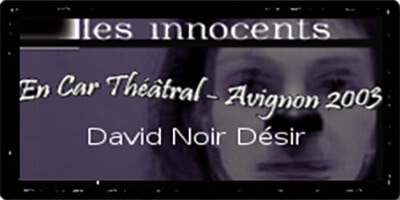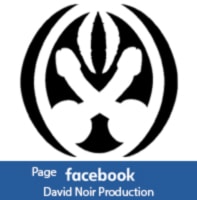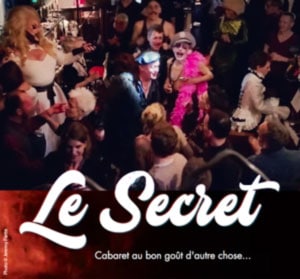En Car Théâtral - Avignon 2003
David Noir Désir
The last part of a triptych that began with "The Righteous" and "The Puritans", "The Innocents" shocks. You either love it or hate it, you either interpret it or give up while the actors drop their trousers. Actor and director David Noir is very vocal about his fringe approach to the stage, but his vision raises so many questions that it would be all too easy to come away completely lost, ready to spit on it. To limit this play to a series of metaphysical farts with a hint of misplaced avant-garde pretension would be a lack of respect for the author, and a lack of self-respect if you don't even want to bother to understand. Whether or not one agrees with the subject matter is another matter.
En Car Théâtral: Your play does raise a number of questions. The first one is probably a recurring one: the meaning, the main thread of the work?
David Noir: The common thread, if there is one, is of the psychic order. It appeals to mental sensations. It has been the same since the last three shows, which were called "Les Puritains", "Les Justes" and this one. The basis of the work I do is the childhood bubble, the abuse by the adult. But it's not necessarily the childhood of children, it's the childhood that we are obliged to repress, to control, to castrate, to incarcerate etc. And there is inevitably a revolt at some point which also tyrannises us. We live in a time when people are thirsty for fantasy. What I call fantasy is traditional fiction, the FR3 television film, which is a false dream. For me, it's a question of taking an interest in oneself, almost biologically, and at that point you can unravel the threads. It's quite a palaeontological approach! So, my play is inspired by a short story by Henry James, "Le tour d'écrou", because of the feelings it contains, and all the films that are linked to it. We did a lot of cinema sessions, screenings of films from the fifties to the present day that were inspired in one way or another by the children in "The Turn of the Screw", such as "The Village of the Damned". These children touch me because they are not childish. They are not childish because, from the start, they are asked to be adults. They are raped somewhere, but it's the rapes that we don't talk about, it's this famous mental paedophilia that is at the origin of many things. We accuse the big visible monsters like Jean-Marie Le Pen and Hitler, but everyone has that, to a certain degree. The point is also that people are not necessarily good people, and neither is the public! There is this idea that the first racism is to think that you are good. I prefer to be precise rather than good. There are things that are drinkable, others less so, and all this must be expressed on the theatre stage. It's a place where it can be done, where a form of improvisation exists between the audience and the actors. As the audience is shy, it's not a solution to go and violate it because it hasn't necessarily chosen that. On the other hand, there is perhaps a form of mental improvisation that can last into the night afterwards, on which there is a little feedback. It's a question of leaving images, it's a bit like a dream, but not a dream in the banal, dreamlike sense of the term. A dream where you have a relationship with him. And I would like that if it works. It works with an audience that has been following us since "Les Puritains", others are discovering it. It's a movement in progress!
E.C.T.: Would you feel you are selling yourself if you wrote in a more traditional way, so as to make your work less hermetic to the public?
D.N.: If that means transforming a transversal, vertical score into a linear form, no! It's my form that interests me; everyone has a background. Everyone drinks, eats, fucks. For me, it's the form that must evolve. So if people can't read what I'm proposing, they can learn. I'm not the one who's going to transform my writing so that they can read it. I'm more interested in pulling things up to what I think is the top. People still believe in the comedians' entrances and exits, they still want to believe that when an actor goes backstage to put on make-up, the character has left. I can't! I'm interested in knowing that he went to get his make-up done!
E.C.T.: Precisely, your backstage is on stage!
D.N.: Yes, backstage is often great. But behind the scenes of everything. If there's no smell in a cinema, it's because an author is missing, for example. What is important is the subject. But if we don't teach people to be interested in things at the same time, they will continue to consume. We don't give a damn about consuming, in fact. The point is not to ingest culture, and that's where we're going wrong at the institutional level. It's not about consumption, it's about knowledge. Besides, it's not me saying it, it's a video game bubble: "knowledge is the treasure"! I think the language of video games is very beautiful, but it's not accessible to everyone. But it's starting to become more popular, although it's still very complex. And this complexity is a richness! What I like as a spectator, which is increasingly rare, is to be lost. If I already know, as in most cinema films, what is going to happen from the start, I am not interested. It's not an inconsistency for me because it's really written and thought out. But, "The Innocents" for me, it's at least accessible on a sensory level, but it's also a demand for activity from the audience. I don't care whether they paid or not, there is no money god in this. But there is a requirement, this requirement that the spectator demand, because I am not satisfied most of the time with what happens on the set. Especially since the set has become TV. So if that's our reward, thank you!
E.C.T.: How do you convince actors that spending 50 minutes naked on a stage in front of a disturbed audience makes sense?
D.N.: I don't force them. They quickly understand that the body and the animality of the body is the subject. It expresses desire, but not necessarily sexual desire. I try to see what is positive in life and to see someone naked, that interests me, even if I find him or her puking. It's the only way to save him for me. My actors are friends. I don't work with people I don't like. On the set, I try to ensure, through a mutual conviviality, that it is obvious that the body must appear. Afterwards, if it doesn't happen, I will never force anyone. There will always be some who will do it and others who won't. It's like an aquarium with different animal species and I want to respect the animal species. But it's so essential to be naked and to have that representation in our home! It's not a babacoolism either, it's a deep demand to see what the representation of the human being is, and it's basically first of all that. And it attacks the first of the repressions. It's like people who say "we've talked enough about homosexuality", but we still talk less about it than 98% about the rest!
E.C.T.: In your play, at each declamation, the actors take a notebook. Is this a symbol or a reminder?
D.N.: The notebook is completely readable. I don't ask you to learn the text, because I don't like learned roles either. You end up getting into the role, and therefore into the making or the counter-making. So why go through all that? I don't have the time, because we don't earn any money most of the time, we are often in rather difficult conditions. This notebook is physically important, just as musicians have a score in some classical concerts.
E.C.T.: How is the writing process going? Under "illicit" influence?
D.N.: No, under my influence. I'm allergic to drugs! It's a pity, by the way! Maybe it's in the air of time, in the seventies I would have been gladly. My best drug is hate, I have a deep hatred of many things and that's a great boost! But I also have a certain love, and I think it was a journalist who said that about "The Righteous", hate does more service to love than complacency. Writing is very simple: I write all the time, from morning to night. It's like a bowel movement, and then there's a step back. It's the principle of poetry, but today poetry has no place in our society, people think it's going to say Brassens in the metro. For me, it's not that; it's extremely active, it's concrete and my texts have the coherence of poetry. It's strange that people still ask about coherence because René Char is not a modern phenomenon!
E.C.T.: Can you understand that people in the audience use the word pervert to describe your play?
D.N.: It's profoundly stupid! I don't think anyone could stand it. That said, it's either good or bad for them, because it means that it reflects something back to them. Our strength and what I cultivate the most, apart from any aestheticism, is the exposure of the body in its simplest, most playful and most childish form, and it also speaks of the relationship between man and woman, in the fact that we are not in this relationship that I hate and which is the relationship of the New Wave people, that is to say, to put love on a pedestal and then crush it! It's a relationship of another form of sexuality, another form of desire where you can have your cock pulled because it's also a toy. With girls, it's more delicate because there's a medical intimacy, but it would amuse me to make it a "slot" thing, a coin thing to get a bottle of Heineken behind. The fact that we don't care is the great fruit of the work! It's fun to play with your body, but if someone calls it perverted, they have a very backward sexuality and are very dangerous to us.
E.C.T.: Is it your aim to challenge the sexuality of the audience? Are you aware that people in the audience are mainly looking at people of the opposite sex?
D.N.: There is a statistic that says that one fifth of the population is homosexual. People do what they want, what interests me is to define myself. What an author has to do, and that's why he doesn't earn a living otherwise. Because all the time I spend here is time I spend not eating! And what's important for me is to claim my bisexuality. You have to know that there is much less heterosexuality than you think, but it's a matter of norms and I hate them because they don't really exist. The only standard that exists for me is that there are people who do a good job and people who do a shitty job! Those who have a stinking aura and those who are honest...that makes sense.
E.C.T.: At one point in your play, we are treated to a beautiful blow job and facial ejaculation on a giant screen, what is the point of this in the show?
D.N.: It's a moment of zapping text, and this image of pornography is very soothing. And, on stage, we are in a childish context and then we learn to be adults, and this great nude at the end is a continuous finale. And this sexuality that we don't have on the stage, it's good that it's represented. Because it's hard to get a hard-on on the stage and we don't necessarily want to fuck together! The problem with theatre is that it doesn't want to represent pornography and pornography is the close-up. And that's one of the most interesting things! It's about rise and fall, about excitement and retention, and therefore about disgust too. There are two sides to sexual excitement and this duality interests me a lot. There has to be a moment of sexuality and we can't do it because it will never be in close-up. Even if we filmed it, it's not the theatre that would make it close-up. That's why we put in that blow job.
E.C.T.: One often gets the impression that you resorted to a form of surrealist writing when writing "The Innocents". Passages like "God is a porn film" for example.
D.N.: You're not going to like it because it's a mockery of surrealism. It's very old for me. I know that Belgians are very attached to surrealism and that makes it very sympathetic. But Breton and so on, I can't... In relation to the people, not the work. Not in relation to the work either when it comes to Magritte: for me, it's suffocating, it doesn't take off. It's a small representation of things. It will never be as good as Dubuffet! So, in relation to the scene, I asked an actress to say "God is a porn film, life is just a question of abortion" and she says it with a slightly institutional tone. It's mockery. On the other hand, "life is just a question of abortion", that's my point of view!
E.C.T.: Why are orangutans and koalas mentioned in the description of your play?
D.N.: The koala is an animal that fascinates me. It has this kind of apparent gentleness. First of all, it has this clown nose that reminds me of Albert Fratellini, with this black nose that he invented, there are photos where it looks like they are all fucking each other, but with a look that you can always interpret. It's like primates! They are essential, we worked a lot on that because it's the limit of the consciousness of things. The monkey evokes much more than it thinks.







